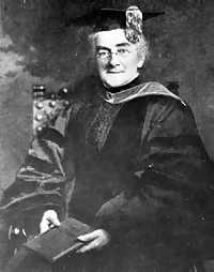Ellen H. Swallow Richards (1842–1911)
Women’s Advocate, Sanitation Engineering Pioneer
One of America’s first female professional chemists and the first woman to be accepted by a scientific school, Ellen H. Swallow Richards is best known for pioneering the field of sanitary engineering. Richards performed an unprecedented survey in 1890 that led to the first state water-quality standards in the nation. She is credited for making important contributions to the understanding of environmental systems.
Paving Pathways in Academia
Richards developed an interest in chemistry while at Vassar College in Poughkeepsie, NY. Upon graduation, she applied for various industrial chemistry apprenticeships, but she was rejected from every one. Instead, she made her way to the male-only Massachusetts Institute of Technology (MIT) in 1871, where she was admitted as a special student, making her the first woman in America to enter a scientific school.
Within three years, Richards earned a second bachelor’s degree from MIT in addition to a master’s degree from Vassar College on the basis of a thesis she submitted on the chemical analysis of iron ore. Richards continued at MIT for two years in hopes of earning a Ph.D., but at the time, the Institute did not award doctorates to women.
From 1873 to 1878, Richards taught chemistry without a salary or title. Recognizing the need for practical facilities for women to conduct research, she helped establish the Women’s Laboratory at MIT, which opened in 1876. The laboratory closed in 1883 after MIT began awarding undergraduate degrees to women on a regular basis. In 1879, Richards was recognized as an assistant professor in chemical analysis, industrial chemistry, mineralogy, and applied biology, though still without pay.
Pioneering Sanitation Engineering
When MIT opened the nation’s first laboratory of sanitary chemistry in 1883, Richards was appointed assistant chemist. Within that time, she participated in sewage treatment research, analyzing as many as 40,000 samples. Her work is distinguished in the final report: “The accuracy of the work and the no less important accuracy of the records were mainly due to Mrs. Richards’s great zeal and vigilance.”
In 1890, MIT established a sanitary engineering program, and Richards was appointed instructor. At the request of the Massachusetts State Board of Health, Richards and her assistants performed a water-quality survey of Massachusetts’ inland water bodies, many of which were already polluted with industrial waste and municipal sewage. According to the Chemical Heritage Foundation, “The scale of the survey was unprecedented: it led to the first state water-quality standards in the nation and the first modern municipal sewage treatment plant, in Lowell, Massachusetts.”
From 1887 to 1897, Richards served as official water analyst for the State Board of Health. She continued as an instructor at MIT until her death in 1911. She and her colleague, A. G. Woodman, also wrote a classic text in the field of sanitary engineering: Air, Water, and Food from a Sanitary Standpoint (1900). Richards is the author of more than 15 books, numerous articles, and reports in environmental science and engineering.
Sources
- Rayner-Canham, Marelene and Geoffrey Rayner. (1998). The first generation of professional women chemists. Women in chemistry: Their changing roles from alchemical times to the mid-twentieth century (pp. 51-55). Danvers, MA: American Chemical Society and Chemical Heritage Foundation.
- Trescott, Martha M. Women in the intellectual development of engineering: A study in persistence and systems thought. (1990). Women of science (pp. 150-157). Bloomington and Indianapolis, IN: Indiana University Press.
- Ellen H. Swallow Richards. (n.d.). Chemistry in History. Retrieved from http://www.chemheritage.org/discover/chemistry-in-history/themes/public-and-environmental-health/public-health-and-safety/richards-e.aspx.


